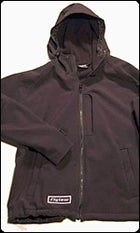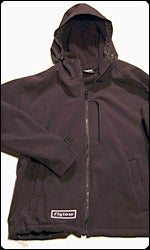I was only about ten minutes into my hike near Red Mountain Pass, in Silverton, Colorado, when I really started to appreciate FlyLow’s Black Coat. It was a crisp 25 degrees in early January, and I was sweating. So I did what any intelligent backcountry skier does when she gets too warm during the ascent: I unzipped my pits.
FlyLow Black Coat
 FlyLow Black Coat
FlyLow Black CoatOn FlyLow’s jackets, the pit zips are a generous 15 inches, a good deal longer than most soft shells. FlyLow apparel is designed specifically for backcountry and telemark skiing: The jackets are built with a waterproof membrane like a mountaineering shell but come fully vented to ensure cool climbs and warm descents; the pants come with extra room in the knees.
The inside of the Black Coat is lined with soft micro-fleece,but I didn’t overheat as I skinned up. After a couple of hours I reached the top of the pass and prepared anxiously for the ski down. It hadn’t snowed in southern Colorado in over a week, but there were still some fresh lines to be had.
I threw on my helmet, and the hood slid over it easily—a plus for those extra windy days. Standing at nearly 12,000 feet, taking in the view of the surrounding San Juan Mountains, I didn’t have to remove my gloves to grab the zips, a nice detail for easier handling in extreme conditions. Small storm flaps keep the zips dry.
The Black Coat looks and feels like any ordinary soft shell. But where it excels, I discovered, is in the attention to detail. And as I skied sweeping telemark turns down the open face, enjoying nearly fresh knee-deep powder, the jacket was the furthest thing from my mind—which is a good thing. $200;


